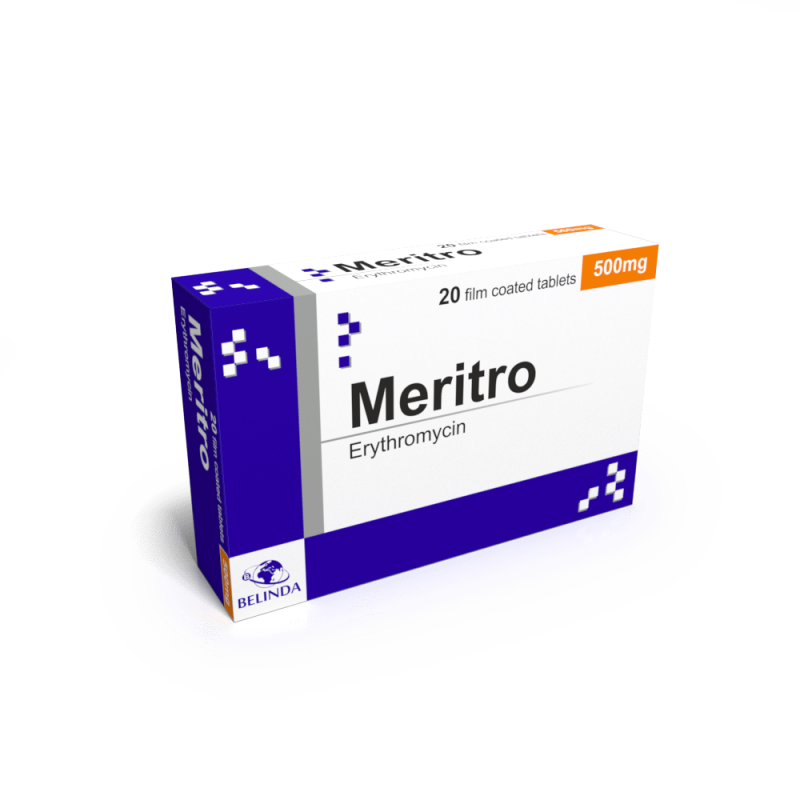
Manual
Each film coated tablet contains:
- Erythromycin stearate BP eq. to Erythromycin 500 mg;
- Approved colours used in coating.
Should be used with the following indications:
For the prophylaxis and treatment of infections caused by erythromycin-sensitive organisms.
Erythromycin is highly effective in the treatment of a great variety of clinical infections, such as:
- Upper Respiratory Tract infections: tonsillitis, peritonsillar abscess, pharyngitis, laryngitis, sinusitis, secondary
- infections in influenza and common colds
- Lower Respiratory Tract infections: tracheitis, acute and chronic bronchitis, pneumonia (lobar pneumonia,
- bronchopneumonia, primary atypical pneumonia), bronchiectasis, Legionnaire’s disease
- Ear infection: otitis media and otitis externa, mastoiditis
- Oral infections: gingivitis, Vincent’s angina
- Eye infections: blepharitis
- Skin and soft tissue infections: boils and carbuncles, paronychia, abscesses, pustular acne, impetigo, cellulitis,
- erysipelas
- Gastrointestinal infections: cholecystitis, staphylococcal enterocolitis
- Prophylaxis: pre- and post-operative trauma, burns, rheumatic fever
- Other infections: osteomyelitis, urethritis, gonorrhoea, syphilis, lymphogranuloma venereum, diphtheria, prostatitis, scarlet fever
Set individually, depending on the location and severity of the infection, the sensitivity of the pathogen.
For oral administration.
For adults and adolescents over 14 years – 250-500 mg, daily dosage – 1-2 g. Interval between doses – 6 hours. In severe infections, the daily dosage may be increased to 4 g.
Children from 4 months to 14 years, depending on the age, body weight and severity of the infection – 30-50 mg / kg per day in 2-4 doses.
Children of the first 3 months of life – 20-40 mg / kg per day, in the case of serious infections the dose may be doubled.
The treatment of diphtheria carrier – 250 mg 2 times a day.
Primary syphilis – 30 to 40 g given in divided doses over a period of 10 to 15 days.
Intestinal Amebiasis: Adults – 500 mg every 12 hours or 250 mg every 6 hours for 10 to 14 days. Children – 30 to 50 mg/kg/day in divided doses for 10 to 14 days.
Legionnaires’ Disease – Although optimal dosage has not been established, doses utilized in reported clinical data were 1 to 4 g daily in divided doses, during 14 days.
Gonorrhoea – 500 mg every 6 hours for 3 days, then – 250 mg every 6 hours for 7 days.
Preoperative bowel preparation to the prevention of infectious complications – oral, 1 g per 19 h, 18 h and 9 h prior to surgery (total 3 g).
Prevention of streptococcal infection (tonsillitis, pharyngitis) – Adults – 20-50 mg / kg per day. Children – 20-30 mg / kg per day, the duration of the course – at least 10 days.
To prevent bacterial endocarditis patients with heart defects – 1 g for adults and 20 mg / kg – for children, for 1 hour before therapeutic or diagnostic procedure, 500 mg more – for adults and 10 mg / kg for children repeatedly after 6 hours.
Whooping cough – 40-50 mg / kg per day, given in divided doses for 5 to 14 days.
Pneumonia in children – 50 mg / kg per day in 4 divided doses, for at least 3 weeks.